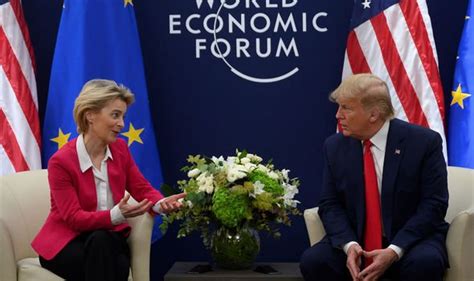The tension between the European Union and the United States has been escalating as EU Commission President Ursula von der Leyen recently made a strong statement regarding retaliatory actions against President Donald Trump’s imposed tariffs. This move could potentially have significant repercussions on global trade relations and economic stability.
“We are prepared to respond appropriately.”
Von der Leyen’s assertion indicates the EU’s firm stance in defending its interests amidst growing trade disputes with the US. The threat of retaliation underscores the seriousness of the situation, raising concerns about a potential trade war that could harm businesses and consumers on both sides of the Atlantic.
The issue stems from Trump’s administration imposing tariffs on various EU exports, including steel and aluminum, citing national security concerns. In response, the EU views these tariffs as unjustified and is considering countermeasures to protect its industries and ensure fair trade practices.
The Complexity of International Trade
International trade dynamics are intricate, with countries engaging in complex negotiations to secure favorable terms for their economies. The imposition of tariffs can disrupt established trade relationships, leading to strained diplomatic ties and economic uncertainties.
Experts point out that retaliatory measures by the EU could lead to a tit-for-tat escalation of tariffs between the two trading blocs. Such a scenario would not only impact transatlantic trade but also reverberate across global markets, affecting investor confidence and overall economic growth.
Expert Insights on Trade Strategies
Economists emphasize the importance of strategic decision-making in trade disputes to prevent long-lasting damage to international commerce. Both the EU and the US must carefully weigh their actions to avoid an all-out trade conflict that could result in higher prices for goods, reduced market access, and job losses in export-dependent industries.
Navigating these turbulent waters requires diplomacy, negotiation skills, and a deep understanding of each party’s priorities. Finding common ground through dialogue and compromise is essential for de-escalating tensions and fostering mutually beneficial trade agreements.
As stakeholders closely monitor developments between the EU and US, analysts warn against underestimating the ripple effects of protectionist policies on global supply chains. A breakdown in transatlantic trade relations could disrupt interconnected markets worldwide, creating challenges for businesses operating internationally.
The Role of Multilateral Agreements
The current situation underscores the significance of multilateral agreements such as the World Trade Organization (WTO) in providing a framework for resolving trade disputes through arbitration and dialogue. Adhering to established rules-based systems can help prevent unilateral actions that destabilize global commerce.
In conclusion, Ursula von der Leyen’s announcement signals a pivotal moment in transatlantic relations as both sides navigate sensitive issues related to trade policy. The potential implementation of retaliatory measures underscores the need for diplomatic solutions that prioritize cooperation over confrontation in addressing trade imbalances.

